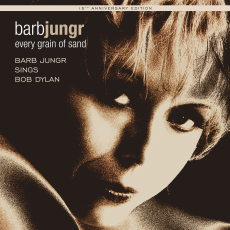Barb Jungr – Every Grain of Sand – The Telegraph
Unlikely marriage leads to an enchanted evening
In the fickle heart of the West End, at the turbulent epicentre of the pre-Christmas push and shove, the English chanteuse Barb Jungr has created a sanctuary for tender passion, wit and soul-searching reflection. Down in the crypt-like space of the, Barb, Bob and Brel brings together an unlikely but wholly mesmerising trinity of talents – aworld-class female vocalist and two of the great male singer-songwriters of modern times – Bob Dylan and Jacques Brel.
Faced with the question "what exactly do Dylan and Brei have incommon?", Jungr leaves her thesis paper blank. She may sound like a scarily intense, spiky sort – thanks to her Czech and German parentage – but, born in Rochdale, her most salient personality traits are earthiness and pluck, denoted by the warmest of smiles.
She's marrying Bob'n'Brel because she took a shine to both. It's that simple. With Jungr you quickly realise you're in the presence of someone who feels her way instinctively into the heart of the music she self-aggrandisement isn't her game.
She ends up achieving an informal atmosphere in which general affinities between the two are there for the spotting – the intensity, the intelligence, the way irony is used to shield raw emotion. Songs expressing similar moods, most of them dark and lovelorn, are paired off. And, by paring down the original arrangements with her piano accompanist Russell Churney, she persuasively places Dylan within a European cabaret tradition – without claiming him as a permanent fixture.
The warm radiance of her voice makes the material softer, stiller. Those irritated by Dylan's whiney warble will find the diva's unostentatious opulence a real fillip, while diehard fans can hardly take offence to hear such heartfelt tracks as If Not For You (1970) and What Good Am I? (1989) given such heartfelt utterance. Only in her skipping-rope quick version of Tangled Up in Blue does one miss the jangled tones of Dylan himself.
I could quibble that I'd rather hear the Brel in the original French than in translation – the flatness of, say, The Song of the Old Lovers compared with La Chanson des vieux amants is a typical by-product of anglicisation. But Jungr's evocative melancholia, alive to the despondency at human transience in Amsterdam, or alert to the plaintive urgency in Ne Me Quitte Pas, provides ample compensations. This is an enchanting evening, a perfect antidote to seasonal shallowness.

